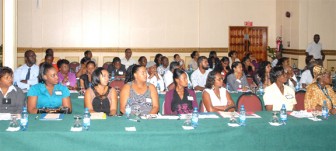Giving more recognition to men’s achievements to boost morale and developing programmes that focus on the perpetrators of violence against women are among proposals by interest groups to address domestic violence.
The recommendations emerged out of a one-day forum, organised by the Women and Gender Equality Commission in collaboration with the United States Agency for International Develop-ment/ Gover-nance Enhance-ment Projec (USAID/GEP), held at the Pegasus Hotel, in Georgetown on Thursday.
The forum was organised in recognition of International Day for the Elimination of Violence Against Women and saw participation from a cross section of organisations and interest groups and their major recommendations are expected to be taken to legislators in the National Assembly, and minor ones to agencies and organisations for implementation.
“We will take all the recommendations and we will set up a working group to look at the issues,” Chairperson of the Women and Gender Equality Commission, Indra Chanderpal said, in closing the forum.

Afterwards, she told Stabroek News that the proposals would form part of the next Commission report to be submitted to the National Assembly. Those that could be included in curricula reform would be dispatched to the Ministry of Education for implementation, she said.
Head of the Department of Sociology, Andrew Hicks and Former Chief Probation Office Sylvia Conway, who were presenters and facilitators at the forum, are to be part of the working group to examine the recommendations, Chanderpal added. Hicks, in his presentation, examined the question of whether men are threatened when women are empowered, while Conway explored the question of whether women are responsible for male aggressiveness.
Recommendations would eventually be posted on the Women and Gender Equality Commission’s website and hard copies would be circulated.
Chanderpal stressed the need for aggressive inclusive action to be taken, saying that “violence can’t be dealt with in a piecemeal way; it has to be a national response.”
While over 90 percent of the participants at the forum were women, the few men present were actively involved in discussions and formulating recommendations. In addition to the importance of eliminating violence against women, the need for gender equality was also emphasised.
One group stated that the media needed to highlight achievements of men more regularly, in an attempt to boost their morale since men often feel like their contributions to the development of their families and society are taken for granted. This recommendation was met with thunderous applause from the participants and one woman shared that in her office a male supervisor is usually balancing statistics while feeding his baby who was beside him in pram. Many informed that as the roles of women changed, with many now being major or sole breadwinners, so have the roles of men, who can be seen performing what were once deemed “women’s chores,” such as cooking, cleaning and washing.
Another recommendation was that programmes be implemented for perpetrators of violence against women, since most local programmes are geared towards helping the victim while and the perpetrator is only given judicial penalties.
The reintroduction of moral education into public schools’ curriculum was also floated and many felt this would inculcate in children from a young age what was expected of them as positive contributors of society.
Other recommendations included social and cultural re-education, parental skills training, more incentives for male teachers, corporate sponsorship for social training, and the development of a community justice system as an alternative to the courts.
Giving brief remarks were also United States Ambassador Brent Hardt, Deputy Chief of Party GEP, Kevin McLaughlin, and CEO of the Commission Diana Swan Lawrence.
The United Nations General Assembly designated November 25 as the International Day for the Elimination of Violence Against Women.





